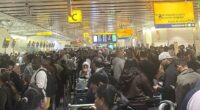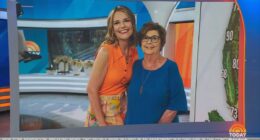Share this @internewscast.com
In this pool photograph distributed by the Russian state agency Sputnik, Russia’s President Vladimir Putin chairs a meeting of the Russian Military-Industrial Commission in Perm on September 19, 2025. (Photo by Gavriil Grigorov / POOL / AFP) (Photo by GAVRIIL GRIGOROV/POOL/AFP via Getty Images)
POOL/AFP via Getty Images
On Thursday, Russian President Vladimir Putin held a televised event to discuss the current state of the Russian economy. During his speech, the Russian leader dismissed international reports that claimed that the Russian Federation may be heading toward a recession. Instead, Putin suggested that the Russian government is deliberately slowing down the economy to suppress inflation.
“The decline from more than 4% GDP growth: this is not a decline, it is a deliberate action,” Putin said during the televised event. “It is a slowdown in growth in exchange for curbing inflation and maintaining macroeconomic stability.”
Not everyone is as optimistic about the Russian economy, however. During an economic conference in St. Petersburg in June, Russian Minister of Economic Development Maxim Reshetnikov presented a warning about the state of the Russian economy.
“The numbers show [the Russian economy] is cooling off,” Reshetnikov said during the economic conference. “Judging by business sentiment at the moment, [Russia is] basically already on the brink of falling into a recession.”
Similarly, the Bank of Russia presented data that suggests that Russia’s “GDP has been shrinking this year.” Fortune magazine concluded that the findings from the Russian central bank are a “sign [that] Putin’s war economy has slipped into a recession.”
Economists, journalists, and international organizations have agreed with these assessments made by Reshetnikov and Fortune. For example, Tatiana Orlova, the lead economist for emerging markets at Oxford Economics, told Yahoo Finance that Russia is “teetering on the brink of a recession.” Similarly, in an article published by Radio Free Europe, senior international correspondent Mike Eckel wrote that “Russia’s war economy is heading to recession,” adding that “Russia is facing the first significant economic slowdown since the start of the full-scale war” in Ukraine.
Finally, a report published by the International Monetary Fund projected that Russia’s GDP would grow only by 0.9% in 2025. This is a significant change from 2024, when the Russian economy grew by 4.1%. The IMF also predicted that the Russian economy will only increase by 1% in 2026. (The World Bank provided a similar forecast in its own assessments of the Russian economy for 2025 and 2026.)
Based on these evaluations, it appears that the Russian Federation is beginning to see the full economic impact of international sanctions as well as the war in Ukraine. Should these economic trends continue, this may alter how the Russian Federation will continue its invasion of Ukraine.
Impact Of International Sanctions On Russia
When Russia launched its full-scale military incursion into Ukraine in February 2022, dozens of countries and international organizations came together to punish the Russian Federation for the war. For example, the United States, Canada, the United Kingdom, and the European Union imposed sanctions on Russian government officials, businesses, and organizations. As a result, hundreds of Russian oligarchs, politicians, and government officials had their assets frozen or seized. Furthermore, roughly a dozen Russian banks were removed from SWIFT, the international financial messaging system. Over one thousand international companies terminated or suspended their business operations in Russia. Finally, dozens of countries, primarily in Europe, stated that they would reduce their consumption of Russian oil and gas.
It is estimated that the Russian Federation has lost at least $450 billion in revenue due to these international sanctions. These restrictions also resulted in a decline in trade for Russia, as several goods and services could not be exported to the Russian Federation.
Despite these penalties, the Russian economy has managed to stay afloat. This is partially because many companies and banks in South America, Africa, and Asia have undermined the impact of international sanctions. Several businesses in these continents have continued to trade with Russia, and this has helped stimulate the Russian economy. Additionally, several companies had served as third-party intermediaries, where they re-export Western goods and services to Russia. Furthermore, some energy corporations in countries such as Turkey and India have purchased Russian crude. It is then refined with other oils and sold to countries around the world. The revenue earned from these energy sales has helped stimulate Russia’s economy.
Russia’s former leader Dmitry Medvedev (wearing a leather coat), a President Putin ally who is now deputy chairman of the country’s security council, tours Uralvagonzavod, Russia’s main tank factory in the Urals, in Nizhny Tagil on October 24, 2022. (Photo by SPUTNIK / AFP) (Photo by -/SPUTNIK/AFP via Getty Images)
SPUTNIK/AFP via Getty Images
Russia’s Wartime Economy
Aside from these exchanges with companies from South America, Africa, and Asia, the Russian Federation has also adopted other strategies to keep its economy afloat. For example, the repurposing of the Russian economy has helped Russia’s economic situation as it seeks to combat the effects of sanctions.
Following the implementation of international sanctions, the Russian government decided to prioritize military production and its defense industrial complex. During this process, the Russian government redirected resources and labor toward the military-industrial sector.
This decision to move toward a wartime economy initially presented Russia with several benefits. For example, in 2023 and 2024, Russia’s GDP grew by 3.6% and 4.1%, respectively. The Russian workforce also experienced wage increases, the unemployment rate decreased, and several manufacturing companies within Russia expanded. This resulted in a strong Russian economy, despite the negative impacts of international sanctions.
(GERMANY OUT) Ein-Rubel-Münze vor russischer Fahne mit Rissen, wirtschaftliche Folgen von Sanktionen gegen Russland (Photo by Christian Ohde/McPhoto/ullstein bild via Getty Images)
ullstein bild via Getty Images
Current Economic Challenges In The Russian Federation
But the continuation of this wartime economic model for Russia has started to create economic imbalances. For example, due to the shift toward the defense industrial complex and military spending, industrial factories in Russia have seen a decline. The Carnegie Endowment has reported that industrial factories within Russia are only operating at 81%. This has resulted in labor shortages within civilian industries. As a result, fewer consumer goods are being produced.
Rising consumer costs have also started to impact the Russian economy. The price of food, goods, and services has increased due to a high domestic demand for these products. There has also been an increase in production costs to produce these goods and services, which has further led to a rise in prices for these products. As a result, several Russian families are struggling to adapt to the rising costs, and this has impacted their standard of living. In other words, Russian citizens are being burdened by the changes in the Russian economy.
Finally, inflation has contributed to an economic slowdown in Russia. According to a report by France 24, the Russian Federation’s decision to increase its defense budget to finance the war in Ukraine has been a significant reason for rising inflation within Russia. This has caused the Russian economy to overheat.
The Bank of Russia has attempted to cool Russia’s overheating economy by gradually adjusting interest rates. But these efforts have not been enough to offset the effects of increased government spending on the defense industrial complex. As a result, this has led Reshetnikov and other economists to predict that the Russian Federation is nearing an economic slump.
No one is certain if Russia’s economy will enter a recession this year. But as the Russian government continues to increase its focus on wartime spending while redirecting resources from civilian sectors, this will only exacerbate Russia’s economic situation, thus making a recession in 2025 more likely. It remains to be seen how the Russian government will respond to these ongoing events, and what impact this will have on the ongoing war in Ukraine.







